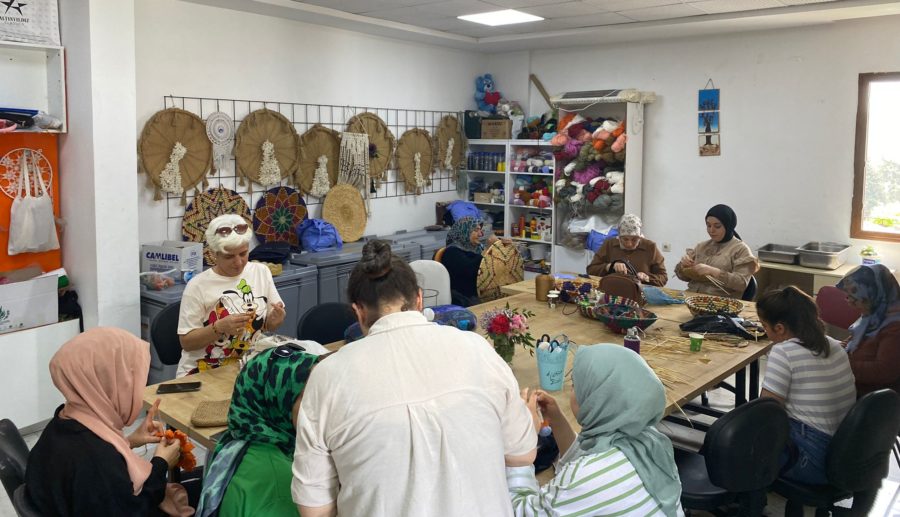
The Yaren Cooperative (Yaren Kooperatif) focuses on rural development and minimising inequalities through sustainable projects, and aims to enhance young people’s well-being.
The cooperative is receiving a grant from our Digital Transformation Fund, to measure the digital maturity levels of cooperatives in Hatay and provide tailored training programs to enhance their capacity.
Please read the following interview with the organisation for an insight into their work and the impact of their initiatives.
Can you describe the current situation of your field of work at Yaren Cooperative?
Yaren Cooperative was established to contribute to local social development with a focus on rural development. We aim to minimise inequalities and social exclusion by creating sustainable development projects that provide social balance. We blend ancient knowledge with technology and science. Like the people who shaped the history of Anatolia, we aim to set a benchmark for progress and benefit society through our projects, drawing strength from diversity. Initially focused on the Aegean region, we plan to expand sustainable development projects nationwide as a non-profit, democratic social cooperative.
Examining global trends, we see that technology and digitalisation are rapidly advancing in all areas of life. With our volunteers and partners, we noticed a lack of technological literacy in cooperatives. We decided to address digital development and transformation more effectively for our volunteers and cooperatives.
In 2022, supported by the Support Foundation for Civil Society, our “We Are the Future in Technology” project in the Aegean region provided critical data. The report highlighted that basic technology use is crucial for cooperative competitiveness. Based on this data, we developed projects that shape our recent efforts. After the February 6 earthquakes, we also designed projects that considered the needs of the earthquake-affected areas.
Like the people who shaped the history of Anatolia, we aim to set a benchmark for progress and benefit society through our projects, drawing strength from diversity.
You are implementing the “Coop 4.0, Yaren Digital Maturity and Capacity Development Plan” project with our grant support. Can you tell us about the project’s activities and planned outcomes?
In collaboration with Iskenderun Technical University (ISTE), this project aims to transfer technological knowledge between young volunteers from our previous projects and ISTE students. The project starts with peer-to-peer knowledge sharing, followed by assessing the digital maturity and needs of local cooperatives. We provide technology-based training to enhance digital awareness and productivity.
Fourteen university students from diverse fields from ISTE and the Middle East Technical University (Orta Doğu Teknik Üniversitesi – ODTU) work together, visiting 10 cooperatives in Hatay. They collected quantitative and qualitative data to assess digital maturity using the Yaren Digital Maturity Scale. We are preparing a digital maturity report for the region.
The cooperatives produce local products like olive oil and traditional crafts. Initial findings show a decline in interest in cooperative products post-earthquakes, with most having an annual turnover under 250,000 TL. Although many have e-commerce agreements, their e-commerce revenue is under 20%. Only 15% have adequate computer and high-speed internet infrastructure, with basic digital tools usage below 25%.
Strengthening their digital infrastructure quickly is crucial, along with increasing their online sales. The importance of digital literacy training is clear from these findings.
The main beneficiaries are Hatay cooperatives. They lad in technology use, facing basic infrastructure issues. Rapid improvement in digital literacy is needed.
What transformation do you expect in your target groups with this project?
The initial goal of Coop 4.0 is to support the well-being of ISTE students affected by the disaster. Through collaborative projects and technological knowledge transfer between ISTE students and young volunteers from ODTU, who have also participated in a previous project, students better understand their region’s issues and work towards solutions, enhancing their well-being. They gain practical experience and improve their academic/psychological well-being, and also earn income through their contribution to the cooperative’s work.
The main beneficiaries are Hatay cooperatives. They lag in technology use, facing basic infrastructure issues and low digital awareness. Rapid improvement in digital literacy is needed. This situation mirrors our findings in the Aegean region but is worsened post-earthquakes. Local product cooperatives struggle with communication and revenue. We believe enhancing digital skills can help increase their income and competitiveness.
What are your future goals and projects? How has the Digital Transformation Fund influenced them?
Yaren Cooperative aims to enhance young people’s well-being, contributing to their education, psychological well-being, social interaction, and economic development. We believe in their potential as agents of change, focusing on their empowerment through education, mentorship, and support.
We view cooperatives as crucial for social and cultural roles, not just economic ones. They contribute to the UN’s Sustainable Development Goals, such as fighting climate change, promoting fair work and economic growth, ensuring healthy living, achieving gender equality, and sustainable consumption and production. Strengthening cooperatives is essential for a fair, sustainable, and inclusive society.
Our projects aim to identify and meet the technological and digital needs of cooperatives. Observations across different regions of our country reveal widespread technology usage gaps, impacting cooperatives’ competitiveness. Strengthening digital infrastructure and skills will remain our focus to support sustainable development.
What challenges do you face in implementing your projects, and how do you address them?
Securing financial support is a major challenge. We continually seek funding and grants while ensuring fair compensation for all stakeholders. Direct support for our projects is crucial, and we guide individuals and institutions in need towards sustainable support through their efforts.
This approach not only provides financial assistance but also enhances the sustainability of local economic and social development projects. By valuing labour and conducting a fair distribution, we aim to contribute to societal progress, creating a model of sustainable cooperation and development.



